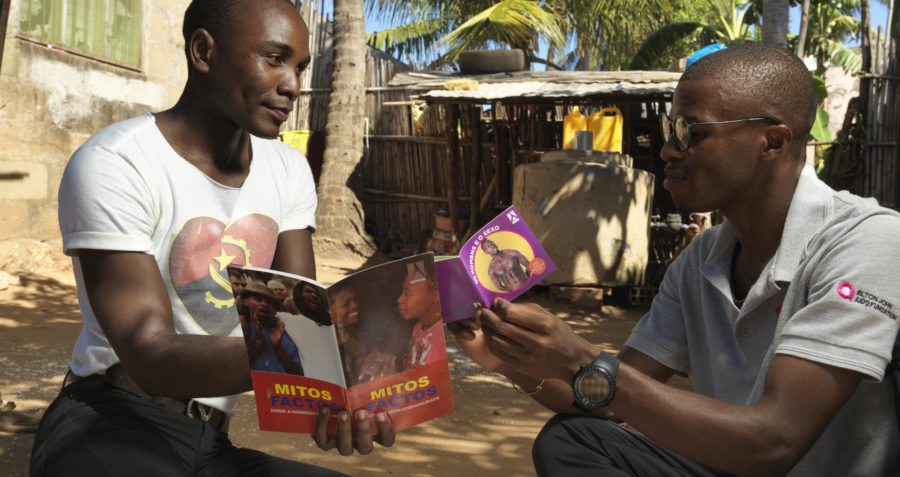Three critical challenges for civil society after the UN high-level meeting on HIV
 © Frontline AIDS/Peter Caton 2019
© Frontline AIDS/Peter Caton 2019
When world leaders and heads of state gathered for the high-level meeting on HIV & AIDS this week, it was with full knowledge that the global drive to end AIDS by 2030 has gone badly off course.
A new report by UNAIDS revealed that, in 2020, the world missed every single global target on HIV. Another 1.5 million people had contracted the virus, and 690,000 had died with AIDS. Last week Frontline AIDS warned that the world may be sleepwalking towards a new AIDS emergency.
All eyes turned to the high-level meeting to produce a bold and ambitious Political Declaration that could end the crisis in HIV prevention and urgently regain a foothold on the climb to 2030. In that, the Political Declaration fell some way short – failing to reach critical compromises on issues of comprehensive sexuality education and intellectual property rules for HIV treatments – but there were important steps forward too.
From Frontline AIDS’ perspective, here are three critical challenges that civil society can take forward from the meeting and Political Declaration.
Inequalities remain a battle ground
In a major shift, the Political Declaration included language that directly address the inequalities that have long driven the epidemic among the most marginalised, such as men who have sex with men, sex workers and people who use drugs. This is an important win for civil society’s efforts to tackle the stigma, discrimination and criminalization that too often prevent those at increased risk from accessing vital HIV services.
However, it was clear that these issues remain highly contested for some governments, with fraught negotiations and heavy edits focused on ‘national sovereignty’ and ‘cultural values’. So strong was the opposition among a small number of member states that, for the first time in UN history, the resolution was not adopted by consensus but by voting. Four countries – Belarus, Nicaragua, the Russian Federation and the Syrian Arab Republic – voted against, in objection to commitments to tackle the impact of the epidemic on the most marginalised.
This ongoing lack of urgency by some governments and civil society partners is concerning, suggesting that many do not recognize the scale of the crisis, while some governments are swerving it altogether. As civil society, we have been here before. In the absence of a unified global response, we must accelerate our own efforts to prevent HIV among those who are most at risk of transmission, and develop innovative strategies that in future, can bridge the polarisation that is standing in the way of progress.
We must also continue to engage with our governments, holding them to account for the Declaration’s new targets on addressing barriers to prevention, such as gender-based violence, the criminalisation of communities at increased risk, and stigma and discrimination. In that regard, the lack of consensus gives a helpful steer on where political solutions to these barriers are most needed.
Communities front and centre
We were delighted to see that the Political Declaration includes specific targets to increase the proportion of HIV services delivered by communities. This is the first time that the vital contribution of community-led organisations and community responses has been explicitly recognised in a Declaration, and further cements the central role communities play in tackling HIV and AIDS.
With this new wind in our sails, civil society must now be extra vigilant in holding governments to account, both on implementing these targets and ensuring that community responses to HIV are fully funded and included in national universal health coverage packages – including services for most affected communities and for adolescents. All of this will help to demonstrate – visibly, forcibly and measurably – what community-led organisations bring to the response.
The HIV movement and pandemic preparedness
With the meeting taking place in the shadow of another pandemic, the impact of COVID-19 was always going to loom large. In another win for civil society, the Declaration addressed specifically how countries can protect and build on what we have achieved in the fight to end AIDS and use that in the struggle against COVID-19.
This included an important commitment to use the infrastructure, resilience and innovation of the community response to HIV to build back better from COVID-19 and prepare for future pandemics. With governments worldwide continuing to divert attention and resources to the COVID-19 crisis, it’s crucial that civil society keeps pushing this message to their governments to reduce any risk that HIV will become the forgotten pandemic.
Tags
United Nations (UN)


